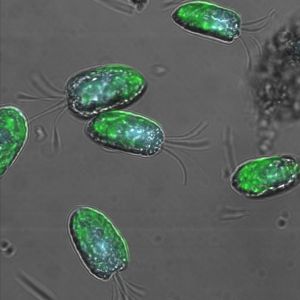Biomass from algae has the potential to supply sustainable energy and to decisively contribute to reducing the climate gas CO2. The new “EnAlgae” (energetic algae) EU project pools the competences of 19 partners to push the development of algae-based biomass production in Northwest Europe. As one of the German partners, KIT coordinates a sustainability analysis of various production methods. The project is designed for a duration of four years and funded with a total of EUR 14 million.
Algae can convert up to 5% of the sunlight into chemical energy in contrast to rapeseed and corn that reach about 1% only. Doing this, large amounts of CO2 are taken up from the atmosphere. As algae can be cultivated in technical systems, they do not require any agriculturally usable areas and do not compete with food production. They grow in saltwater or brackish water or in nutrient-rich wastewater, which reduces competition for water and fertilizers. “From the sustainability point of view, algae have an enormous potential,” explains the project head Dr. Christine Rösch from the Institute for Technology Assessment and Systems Analysis (ITAS) of KIT. “Their use for energy production, however, still is at its beginning and the demand for knowledge-based decision support of politics and industry is quite high.”
EnAlgae is a strategic initiative in the INTERREG IVB Northwest Europe Program, which is financed from the European Regional Development Fund and other funding partners. 19 partners and 13 so-called observers, who are integrated in the activities and give a feedback, participate in the project. They come from eight European countries, i.e. Great Britain, Ireland, France, Belgium, the Netherlands, Luxembourg, Switzerland, and Germany. The project is managed by the University of Swansea in Wales. Among the German partners are KIT, the Fachagentur Nachwachsende Rohstoffe e.V. (FNR Agency for Renewable Resources), and the University of Applied Sciences of the Saarland.
Under the direction of ITAS at KIT, experts make a sustainability analysis of various production methods based on micro- and macroalgae. It is aimed at determining the most efficient and ecologically, economically, and socially most advantageous algae-based process chains as well as suitable locations for algae cultivation. Moreover, a concept for a sustainable algae production plant is to be developed.
According to the “EC Greenhouse Gas Inventory 2009”, Northwest Europe emitted more than 40% of the greenhouse gases in Europe in 2009 due to its high population density, the high degree of industrialization, and extensive agriculture. EnAlgae is aimed at reducing CO2 emissions and the dependence on non-sustainable energies with the help of algae-based biotechnology. Under the EnAlgae initiative, expert centers in Northwest Europe will establish a pilot network.
The project offers unique prerequisites for the sustainable development of this sector. It will influence European policy relating to the production of algae biomass and its use for energy production or other purposes. An updated database on the developments in this field in Northwest Europe will enhance calculability of the respective use potentials and, hence, reduce the development risk for the commercialization of this sector.
“With the INTERREG IVB NWE Program, bioenergy from algae has been given a strategic priority in Europe. The EnAlgae partnership allows for the development and implementation of technologies adapted to social economy and environmental conditions in Northwest Europe,” says project manger Dr. Robin Shields, Director of the Centre for Sustainable Aquatic Research (CSAR) in Great Britain.
Further information can be found at www.enalgae.eu
Karlsruhe Institute of Technology (KIT) is one of Europe’s leading energy research establishments. The KIT Energy Center pools fundamental research with applied research into all relevant energy sources for industry, households, services, and mobility. Holistic assessment of the energy cycle also covers conversion processes and energy efficiency. The KIT Energy Center links excellent competences in engineering and science with know-how in economics, the humanities, and social science as well as law. The activities of the KIT Energy Center are organized in seven topics: Energy conversion, renewable energies, energy storage and distribution, efficient energy use, fusion technology, nuclear power and safety, and energy systems analysis.
Being “The Research University in the Helmholtz Association”, KIT creates and imparts knowledge for the society and the environment. It is the objective to make significant contributions to the global challenges in the fields of energy, mobility, and information. For this, about 10,000 employees cooperate in a broad range of disciplines in natural sciences, engineering sciences, economics, and the humanities and social sciences. KIT prepares its 22,800 students for responsible tasks in society, industry, and science by offering research-based study programs. Innovation efforts at KIT build a bridge between important scientific findings and their application for the benefit of society, economic prosperity, and the preservation of our natural basis of life. KIT is one of the German universities of excellence.

